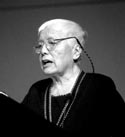Our Organic Intellectuals
 LIVING FOR CHANGE
LIVING FOR CHANGE
Our Organic Intellectuals
By Grace Lee Boggs
Michigan Citizen, March 14, 2010
On March 3 the Boggs Center hosted a conversation on “Spirit-based Economics” with Starhawk (on tour), Detroiters Bill Wylie-Kellerman, Jim Perkinson, Ron Scott and myself.
Starhawk, one of Detroit Summer’s early supporters, is nationally known for organizing affinity groups at anti-corporate globalization demonstrations and for permaculture workshops with young people in the Bay Area. She is also the author of many books and of “Burning Times,” an essay on how the 17th century witchhunts not only expropriated the land of peasants but replaced the compassionate knowledge of women with cold and reductive scientific rationalism. (Read it here on the Boggs Center website)
Because she projects and practices new ways of thinking, organizing and living, Starhawk is one of today’s most important “organic intellectuals.”
The concept of “organic intellectual” was created by the Italian Marxist Antonio Gramsci in the 1930s. Incarcerated by Mussolini, Gramsi used his prison time to reflect on the 1917 Russian Revolution which had become the model for revolutionaries around the world. As a result, he recognized that “the struggle to take state power ” or insurrection is only one phase, the “war of movement“ phase, of the revolutionary struggle. Preceding the “war of movement,” there must be “a war of position,” which is a war of ideas. During this period organic intellectuals develop ideas and practices that challenge and replace the “cultural hegemony” of the ruling class, which maintains its power not only by force but because its ideas and practices are accepted as universal.
Organic intellectuals emerge during periods of great crisis. Thus during the Civil War Frederick Douglass emerged as an organic intellectual because he tried to convince President Lincoln to wage the Civil War not as a war to save the Union but as a war to abolish slavery — not just on behalf of enslaved blacks but to save the nation’s “soul.”
W.E.B. DuBois played a similar role during the Great Depression of the 1930s. Blacks obviously suffered greater hardships than whites. But this didn’t mean that black organizations should focus on struggles against racism. In fact, DuBois split with the NAACP because it was preoccupied with anti-discrimination struggles instead of focusing on the economic issue, which had become the primary or main contradiction facing the whole country. Grappling with the contradiction facing all Americans, DuBois was able to write Black Reconstruction, which boldly projects the idea of black workers governing this country (or the dictatorship of the black proletariat), thus freeing both black and white workers and defeating the “divide and conquer “ strategy of the ruling class.
Organic intellectuals are very diverse. Today they include educators like Gregory Smith and the Boggs Educational Center teachers in Detroit who advocate place-based education to involve children and young people in solving the crisis both in our schools and in our communities. Last week graduate student Michelle Lin contributed a thoughtful piece in defense of community-scale manufacturing.
These days I am avidly reading the works of black artist-novelist-philosopher, Charles R. Johnson. Johnson believes that, with the assimilation of so many blacks (e.g. Colin Powell, Barack Obama, Oprah Winfrey) into the Establishment as a result of the Civil Rights and Black Power movements, we have come to the end of the American narrative of blacks as victims, even though we haven’t achieved a post-racial society. So we need to create a new, more complex narrative that builds on the Transformation-through-Disaster themes in Martin Luther King Jr.’s final speeches. These new narratives are emerging in Johnson’s award-winning novels and in science fiction and films like Avatar.
During the March 3 conversation with Starhawk, Ron Scott told the moving story of his journey as an organic intellectual, from being active nearly 40 years ago in the community-building wing of the Detroit Black Panther Party, to heading the Detroit Coalition against Police Brutality, to his present emphasis on creating Peace Zones out of the War Zones that our neighborhoods have become. For the sake of his own humanity, Ron explained, he had to move beyond Anger and Protest to creating the Beloved Community.
Leave a Comment